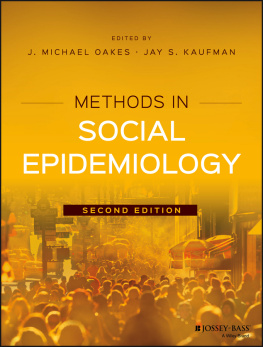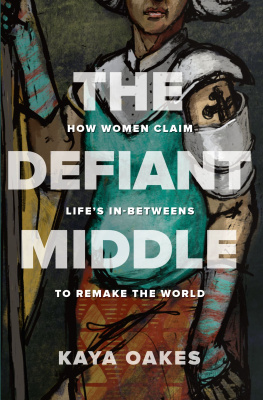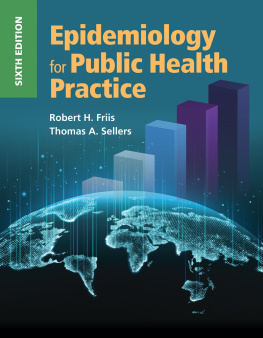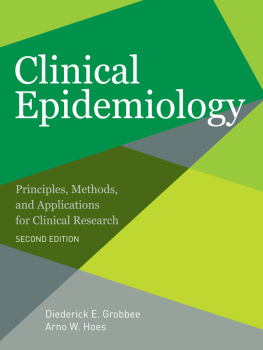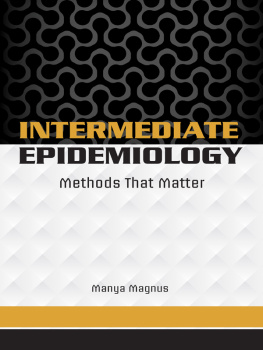Oakes J. Michael - Methods in Social Epidemiology
Here you can read online Oakes J. Michael - Methods in Social Epidemiology full text of the book (entire story) in english for free. Download pdf and epub, get meaning, cover and reviews about this ebook. year: 2017, publisher: John Wiley & Sons, Incorporated, genre: Politics. Description of the work, (preface) as well as reviews are available. Best literature library LitArk.com created for fans of good reading and offers a wide selection of genres:
Romance novel
Science fiction
Adventure
Detective
Science
History
Home and family
Prose
Art
Politics
Computer
Non-fiction
Religion
Business
Children
Humor
Choose a favorite category and find really read worthwhile books. Enjoy immersion in the world of imagination, feel the emotions of the characters or learn something new for yourself, make an fascinating discovery.
- Book:Methods in Social Epidemiology
- Author:
- Publisher:John Wiley & Sons, Incorporated
- Genre:
- Year:2017
- Rating:5 / 5
- Favourites:Add to favourites
- Your mark:
- 100
- 1
- 2
- 3
- 4
- 5
Methods in Social Epidemiology: summary, description and annotation
We offer to read an annotation, description, summary or preface (depends on what the author of the book "Methods in Social Epidemiology" wrote himself). If you haven't found the necessary information about the book — write in the comments, we will try to find it.
Methods in Social Epidemiology — read online for free the complete book (whole text) full work
Below is the text of the book, divided by pages. System saving the place of the last page read, allows you to conveniently read the book "Methods in Social Epidemiology" online for free, without having to search again every time where you left off. Put a bookmark, and you can go to the page where you finished reading at any time.
Font size:
Interval:
Bookmark:

Copyright 2017 by John Wiley & Sons, Inc. All rights reserved.
Published by Jossey-Bass
A Wiley Brand
One Montgomery Street, Suite 1000, San Francisco, CA 94104-4594www.josseybass.com
No part of this publication may be reproduced, stored in a retrieval system, or transmitted in any form or by any means, electronic, mechanical, photocopying, recording, scanning, or otherwise, except as permitted under Section 107 or 108 of the 1976 United States Copyright Act, without either the prior written permission of the publisher or authorization through payment of the appropriate per-copy fee to the Copyright Clearance Center, Inc., 222 Rosewood Drive, Danvers, MA 01923, 978-750-8400, fax 978-646-8600, or on the Web at www.copyright.com. Requests to the publisher for permission should be addressed to the Permissions Department, John Wiley & Sons, Inc., 111 River Street, Hoboken, NJ 07030, 201-748-6011, fax 201-748-6008, or online at www.wiley.com/go/permissions.
Limit of Liability/Disclaimer of Warranty: While the publisher and author have used their best efforts in preparing this book, they make no representations or warranties with respect to the accuracy or completeness of the contents of this book and specifically disclaim any implied warranties of merchantability or fitness for a particular purpose. No warranty may be created or extended by sales representatives or written sales materials. The advice and strategies contained herein may not be suitable for your situation. You should consult with a professional where appropriate. Neither the publisher nor author shall be liable for any loss of profit or any other commercial damages, including but not limited to special, incidental, consequential, or other damages. Readers should be aware that Internet Web sites offered as citations and/or sources for further information may have changed or disappeared between the time this was written and when it is read.
Jossey-Bass books and products are available through most bookstores. To contact Jossey-Bass directly call our Customer Care Department within the U.S. at 800-956-7739, outside the U.S. at 317-572-3986, or fax 317-572-4002.
Wiley publishes in a variety of print and electronic formats and by print-on-demand. Some material included with standard print versions of this book may not be included in e-books or in print-on-demand. If this book refers to media such as a CD or DVD that is not included in the version you purchased, you may download this material at http://booksupport.wiley.com. For more information about Wiley products, visit www.wiley.com.
Library of Congress Cataloging-in-Publication Data
Names: Oakes, J. Michael, 1967- editor. | Kaufman, Jay S., 1963- editor.
Title: Methods in social epidemiology / J. Michael Oakes, Jay S. Kaufman, editors.
Description: Second edition. | San Francisco, CA : Jossey-Bass & Pfeiffer Imprint, Wiley, 2017 | Includes bibliographical references and indexes.
Identifiers: LCCN 2016045214 (print) | LCCN 2016045553 (ebook) | ISBN 9781118505595 (pbk.) | ISBN 9781118603727 (pdf) | ISBN 9781118603734 (epub)
Subjects: | MESH: Epidemiologic Methods | Social Medicine
Classification: LCC RA418 (print) | LCC RA418 (ebook) | NLM WA 950 | DDC 614.4dc23
LC record available at https://lccn.loc.gov/2016045214
Cover design: Wiley
Cover images: Mitchell Funk/Getty Images, Inc.
SECOND EDITION
For
Maddy and Henry
and
Amelia, Julian, Louis, and Sol
Jay S. Kaufman, Ph.D., is a Professor in the Department of Epidemiology, Biostatistics, and Occupational Health, McGill University. Dr. Kaufman's research focuses on social determinants of health and health disparities, and estimating the causal effects of population interventions.
J. Michael Oakes, Ph.D., is a Professor in the Division of Epidemiology and Community Health, University of Minnesota, and Director of the Robert Wood Johnson Foundation's Interdisciplinary Leaders Program. His research and teaching interests include social epidemiology, quantitative methodology, and research ethics, and he has received the school's highest awards for teaching as well as advising and mentoring.
Jennifer Ahern, Ph.D., M.P.H., is the Associate Dean for Research and Associate Professor of Epidemiology at University of California, Berkeley, School of Public Health. She examines the effects of the social and physical environment, and programs and policies that alter the social and physical environment, on many aspects of health (e.g., violence, substance use, mental health, and gestational health). Dr. Ahern has a methodological focus to her work, including application of causal inference methods and semi-parametric estimation approaches, aimed at improving the rigor of observational research and optimizing public health intervention planning. Her research is supported by a New Innovator Award from the National Institutes of Health (NIH), Office of the Director.
Kate E. Andrade, M.P.H., is a doctoral candidate in the Division of Epidemiology and Community Health, University of Minnesota. Her interests include applied research methods for social epidemiology, causal inference, and consequential epidemiology. Her dissertation work is exploring different analytic techniques in neighborhood effect studies.
David M. Betson, Ph.D., Associate Professor of Economics and Public Policy, College of Arts and Letters, University of Notre Dame. His research examines the impact of government on the distribution of income and wealth in the United States with a particular focus on the measurement of poverty. He was a member of the NRC Panel on Poverty Measurement that in 1995 issued a series of recommendations that has led to the new Supplemental Poverty Measure.
Melody L. Boyd, Ph.D., is an Assistant Professor of Sociology at The College at Brockport, State University of New York. Her research focuses on urban poverty, housing, neighborhoods, race, and social policy.
Magdalena Cerd, Ph.D., is an Associate Professor of emergency medicine at the University of California at Davis School of Medicine. In her research, Magdalena integrates approaches from social and psychiatric epidemiology to examine how social contexts shape violent behavior, substance use, and common forms of mental illness. Her research focuses primarily on two areas: (1) the causes, consequences, and prevention of violence and (2) the social and policy determinants of substance use from childhood to adulthood.
Stefanie DeLuca, Ph.D., is an Associate Professor of Sociology at the Johns Hopkins University. Her research uses sociological perspectives to inform education and housing policy. She has carried out mixed-methods studies that incorporate qualitative research into experimental or quasi-experimental designs. Her new book address the children of the Moving to Opportunity Study as they transition to adulthood in Baltimore: Coming of Age in the Other America.
M. Maria Glymour, Ph.D., is an Associate Professor at the University of California, San Francisco, Department of Epidemiology and Biostatistics. Dr. Glymour's work focuses on evaluating social determinants of healthy aging, emphasizing methods to overcome causal inference challenges in observational data.
Peter J. Hannan, M.Stat., was a Senior Research Fellow in the Division of Epidemiology and Community Health in the School of Public Health at the University of Minnesota. Mr. Hannan's research interests included methodological issues with clustering in community trials, multiple imputations, Bayesian statistical analysis, and correspondence analysis. He was involved with the Minnesota Heart Health Program, was a statistical consultant to David Murray's classic text Design and Analysis of Group Randomized Trials, and has done statistical analysis and power calculation sections for many group randomized trials implemented in the Division, and collaborated on a number of methodological papers in his research interest areas. He is widely recognized as a leader in the design and analysis of community trials. Mr. Hannan died from natural causes on September 28, 2015.
Next pageFont size:
Interval:
Bookmark:
Similar books «Methods in Social Epidemiology»
Look at similar books to Methods in Social Epidemiology. We have selected literature similar in name and meaning in the hope of providing readers with more options to find new, interesting, not yet read works.
Discussion, reviews of the book Methods in Social Epidemiology and just readers' own opinions. Leave your comments, write what you think about the work, its meaning or the main characters. Specify what exactly you liked and what you didn't like, and why you think so.

